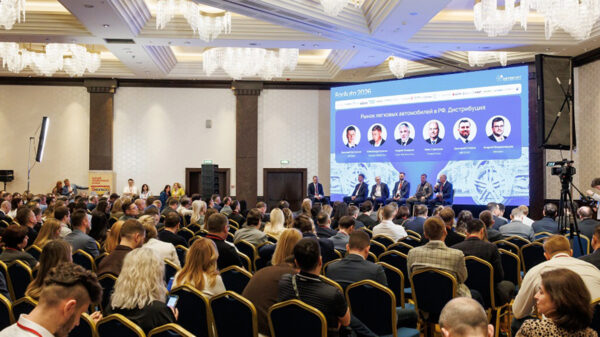
John Lines was one of the first to notice that companies were slowing down hiring. At the beginning of the year, his recruitment firm Ashdown Group was accepting 100 applicants per vacancy. He now sees an average of 150, an increase of 50%.
“This market is much more difficult this year for businesses and for employees,” he says. “There are a little more people and fewer jobs. Employers are not hiring for growth or increasing wages as much as before.”
The UK labor market remains historically strong, with vacancies still 162,000 higher than before Covid.
But for Lines, who receives between 20,000 and 30,000 applications a month for vacancies in areas such as IT, human resources and accounting, this is not the case.
«I would say pre-Covid period was stronger than now,» he says.
«I think we're honestly just trying to avoid a recession. The job market is down at least 25% across the board this year. The economy and business are just keeping their heads above water.”
Job vacancies in the economy peaked at 1.3 million last spring during a post-pandemic hiring boom, Office for National Statistics data shows. Every month since then, the labor market has weakened, slowly succumbing to pressure from 15 years of high interest rates.
At the same time, unemployment increased. The unemployment rate rose from 3.5% to 4.3% from a 50-year low.
Robert Walters, Pagegroup and Hays — Britain's three publicly listed recruitment groups — complained of falling fee income in recent trading reports.
The struggles include wary staff turning down offers, companies advertising far fewer permanent jobs, and high inflation and interest rates are eroding confidence in technology and financial services. Recruiters themselves cut jobs in response to the market downturn.
LinkedIn last week announced it was cutting 668 employees in its second round of layoffs this year, another sign that the post-Covid-19 job market is fading.
White-collar jobs have been hit hardest. ongoing decline, according to Neil Carberry, chief executive of the Recruitment and Employment Confederation (REC).
“I think traditional blue-collar jobs are more protected. Of course, in positions where there is a high level of human contact, hourly paid work, for example, in the field of hospitality, care, logistics — all of these areas have not seen a decline in opportunities, while the situation has cooled in the rest of the labor market. /p>
Bankers, programmers, advertisers and other knowledge workers are at the forefront of this downturn, feeling the pain from hiring freezes, layoffs and pay cut proposals.
ONS data shows that highly skilled jobs are seeing some of the largest jumps in the level of layoffs. Layoffs in professional, scientific and technical jobs have nearly quintupled since last year, with layoffs in the information and communications sectors more than doubling.
At the same time, layoffs have only increased in the transportation and hospitality sectors insignificant.
Carberry says: “I spoke to people in the IT sector a couple of years ago who were forced into counteroffers and by the end of the negotiations, wages had doubled. We are not there yet.
“On the contrary, I think our members are finding much more negotiation about flexible work hours and benefits rather than about wages.
“In the labor market there are real differences in hot and cold spots.”
Recruiters are hesitant to predict how deep the job decline will be, but most expect it to continue into next year.
The Office for Budget Responsibility predicted in March that the unemployment rate would peak at 4.4% in 2024. However, this now appears optimistic as interest rates rose a percentage point more than regulators expected to 5.25%.
p>
Most of the impact of the 14 interest rate hikes seen since December 2021 , has yet to be experienced. This means the pain will begin to spread.
Jack Kennedy on job site Indeed says: “Areas that haven't necessarily seen much success but may be more susceptible to downturn — eg hospitality, leisure, retail.
“As the impact of higher interest rates continues to be felt and more households refinance to more expensive mortgages, this leaves them with less income to spend on discretionary items. This is likely to lead to a deterioration in labor market conditions in these sectors.»
Another issue is the upcoming increase in the minimum wage.
Chancellor Jeremy Hunt has promised to increase the minimum wage. Next year the National Living Wage will reach a minimum of £11 an hour for over-23s, up from the current level of £10.42. The Labor Party wants to raise this figure even higher.
While this is a boost for low-wage workers to keep their jobs, higher costs for companies will put pressure on sectors such as hospitality and retail. That could lead to job losses.
Carberry says many executives have already begun using “coping mechanisms” to cope with rapidly rising wages. Managers prefer to work overtime themselves rather than hire additional staff. Others are cutting back on shifts to control costs.
“People lose hours before they lose their jobs,” he says. “For example, restaurants may close an additional night per week. And here we need to be a little careful. If the minimum wage rises too high, workers may earn more per hour, but they will be offered fewer hours and end up earning less.»
At the moment, most companies are focused on how to retain staff even as economic storm clouds gather, says Chris Gray of recruiter Manpower.
“We are seeing a greater shift towards investing in existing workers and reducing external hiring workers except for niche positions or skills,” he says. “They're doing everything they can to put the money they have into retention, so we're seeing a decline in demand.”
Hugh Pill, chief economist at the Bank of England, recently highlighted the «big gap» between new hires' pay and existing staff's pay, with workers having better opportunities and higher pay than job seekers because employers are focused on retaining people.
Pill said the trend could lead to «a resurgence of insider-outsider dynamics in wage setting,» which could keep inflation high even as unemployment rises as more people find themselves «out» of the market. labor.
Lines fears this will happen. It's the young people in need of experience who will struggle the most in a tougher market.
“Those suffering are likely people trying to get entry-level jobs and who aren't already employed or have had released. It becomes more difficult for them to stay employed because there are fewer jobs and more competition.”
One thing is clear: the employment decline is here, and it is just beginning.
























































Свежие комментарии